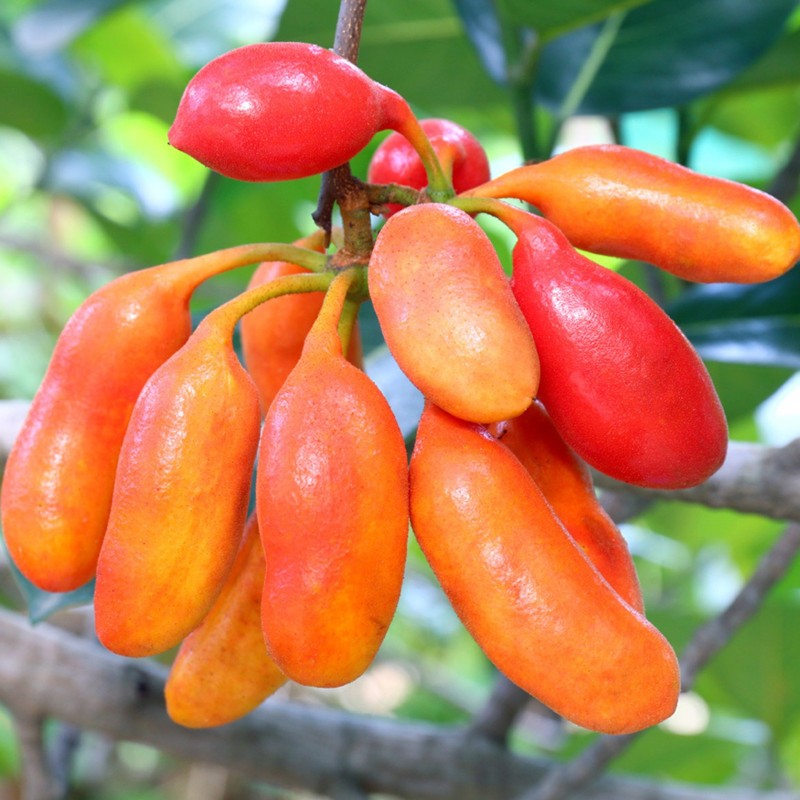Love it? Add to your wishlist
Your favorites, all in one place. Shop quickly and easily with the wishlist feature!
[message]
[title]
[message]

Veliyath Gardens
Couldn't load pickup availability
Botanical Name: Uvaria rufa
Common Names: Susung-Kalabaw, Torres Strait Scrambler
Family: Annonaceae
Native Regions: Thailand, Laos, Cambodia, Vietnam, Malaysia, Indonesia, and the Philippines
The Dunal Fruit, also known as Uvaria rufa, is an exotic woody climbing shrub belonging to the Annonaceae family. This unique plant, characterized by its bright orange-red-yellow fruits and lush foliage, is native to several Southeast Asian countries. Often found in tropical fruit gardens and exotic fruit plant farms, it is a prized addition due to its distinctive appearance and delicious fruit. The fruits are known for their granular, pleasant, sweetish flesh, making them a delightful treat for fruit enthusiasts. Due to its rarity and demand, the Dunal Fruit occasionally experiences shortages at Veliyath Gardens, making it a highly sought-after species in fruit plant nurseries and tropical plant collections.
The fruits of Uvaria rufa are small, oval, or round berries with a vivid orange-red-yellow coloration that makes them stand out against the dark green leaves. The flesh inside is granular with a pleasant sweetish flavor, offering a unique eating experience. The texture is slightly crunchy, similar to a firm custard, and the taste is mildly sweet with a hint of tartness, making it an ideal fruit for fresh consumption. This rare delicacy can be enjoyed straight from the plant, making it a perfect addition to fruit farms and fruit plant gardens.
The Dunal Fruit thrives in humid, tropical environments, making it an excellent choice for tropical plant collections and exotic fruit farms. It prefers a warm climate and good airflow, making it suitable for planting in well-spaced fruit plant gardens. In cooler or dry climates, it can be grown in a greenhouse or conservatory. It’s an adaptable plant, capable of growing both in full sun and semi-shade, making it versatile for various garden settings.
The Dunal Fruit is not only a culinary delight but also packed with several nutritional and health benefits:
The unique flavor and granular texture of the Dunal Fruit make it a versatile ingredient in various culinary applications:
In traditional medicine, various parts of the Uvaria rufa plant have been used for their therapeutic properties:
Due to its unique characteristics and growing demand, the Dunal Fruit Plant occasionally faces supply shortages at Veliyath Gardens. Its rarity and appeal make it a valuable addition to fruit plant nurseries and fruit farms, often sought after by collectors and enthusiasts of exotic fruit plants. If available, it is recommended to acquire it promptly to ensure you don’t miss out on this exceptional fruit plant.
The Dunal Fruit is perfect for fruit gardens, exotic fruit plant farms, and dedicated plant nurseries. Its climbing nature and striking fruits add a vibrant element to tropical plant collections. With its manageable size, eye-catching fruits, and delectable taste, it is a must-have for those seeking to grow unique and exotic plants.
With its rich history, delicious fruits, and numerous health benefits, the Dunal Fruit is a treasure for fruit lovers and tropical plant enthusiasts alike. Consider adding this exceptional plant to your garden and experience the joy of cultivating a rare and valuable tropical delicacy!
With moderate maintenance, the Dunal Fruit is an easy-to-grow addition to any garden, requiring minimal intervention once established. Proper support, regular watering, and pruning are essential for best results.
Antioxidants: Contains powerful antioxidants that protect cells from damage caused by free radicals, supporting healthy skin and organs.
Dietary Fiber: High in fiber, promoting digestive health and aiding in weight management.
Anti-inflammatory Properties: Traditional medicinal uses of the fruit and its leaves indicate anti-inflammatory benefits, making it useful for soothing minor ailments.
Heart Health: Regular consumption of the fruit may contribute to heart health by supporting healthy blood pressure levels.
Fresh Consumption: Enjoyed fresh from the garden, with its sweetish taste providing a refreshing treat.
Salads: Adds a burst of color and a unique texture to fruit salads.
Desserts: The fruit can be used in custards, smoothies, and ice creams to enhance flavor.
Juices: Blended with other tropical fruits to create refreshing drinks and juices.


